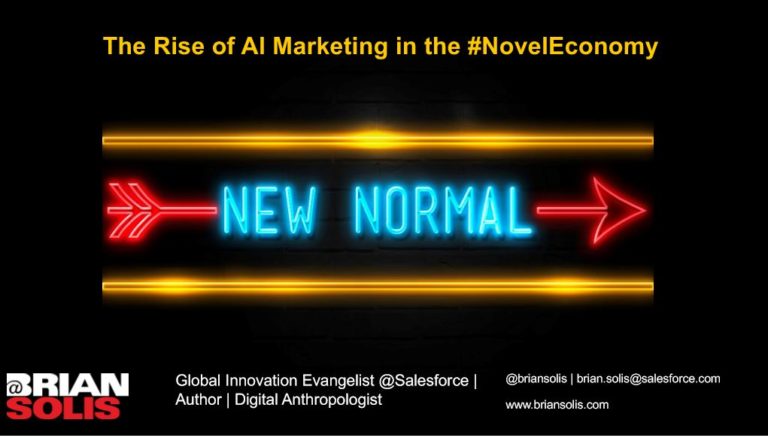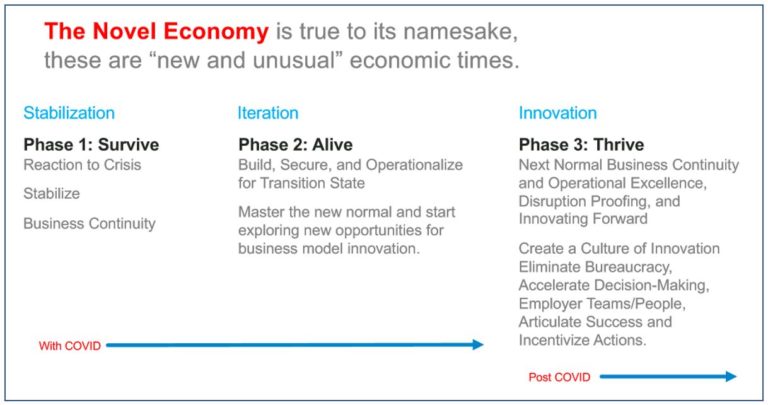30-second summary:
- As part of ClickZ’s AI in Marketing Summit 2020, Brian Solis, digital analyst, speaker, and author, shared his insight into the AI-automated enterprise and it’s role in a post-COVID-19 world.
- AI can help humans make better decisions, and the post-COVID-19 environment is hastening the shift towards automation to improve marketing, CX, and business processes.
- Solis reviews the changing behaviors of consumers BC (Before-COVID-19) and AD (after disruption) and provides some critical advice for brands who must adapt in order to survive and thrive.
- Digital is driving the AD economy, demonstrated by an increase in online/mobile shopping, the use of mobile devices, and a reluctance to shop in physical stores and a strong preference to shop for and purchase products online.
As part of ClickZ’s AI in Marketing Summit 2020, Brian Solis, digital analyst, speaker, and author, gave a keynote where he shared some of his thoughts on the future of customer experience, marketing, and the role of the brand in a post-COVID-19 world.
Solis is a digital anthropologist who has recently taken the role of Global Innovation Evangelist at Salesforce. He discussed how AI is playing a pivotal role in what he dubs the “automated enterprise.”
The future of AI in marketing
Businesses are increasingly transforming into automated enterprises using various AI-based technologies (e.g., RPA, chatbots, real-time analytics, etc.) to better leverage data and provide superior marketing and customer-centric experiences.
“We’re moving into a predictive and intelligent enterprise that can help humans make better decisions,” Says Solis. “Eventually, we’ll be in a position where data and platforms will make decisions without checking in with human counterparts. Ultimately, in the next ten years or so, we’ll start to see the onset of a quantum enterprise.”
Solis views the new post-COVID-19 normal as a novel economy—this is not a new normal, but an interim normal which is permanently changing consumer behavior.
“The interim normal means we need to learn how to operate in these times as best we can, but also that we set the stage for what comes next,” explains Solis.
Understanding the novel economy
Solis emphasized that AI gives us the tools to track new consumer behaviors as they’re evolving, so that we can move forward in this interim normal.
“I want to find ways to deliver incredible experiences to customers and look for ways to enhance the types of experiences that make the best of this situation,” explains Solis. “This is an opportunity to reimagine.”
The novel economy is what Solis describes as the mission of moving forward in the most positive, productive, and human-centered light. It’s a reaction to the crisis of COVID-19, and is structured into three main segments, as follows:
Phase 1: Survive
This is the reactionary phase immediately surrounding the onset of the crisis and requires that companies stabilize operations and maintain business continuity (e.g., restaurants closed in-house dining and moved to curbside pickup).
Phase 2: Alive
The “Alive” phase focuses on building, securing, and operationalizing your organization for a state of transition. Per Solis, “You must master the new normal and start exploring opportunities for business model innovation.”
Phase 3: Thrive
Thriving in a post-COVID-19 world means your organization has successfully transitioned to the “next normal,” achieving operational excellence, disruption proofing, and innovating forward.
Source: Brian Solis
“The novel economy is just a period of time. What comes afterwards is an opportunity to deliver greater experiences. Businesses must find ways to deliver good experiences to customers in the current environment than they did BC (Before COVID-19),” says Solis.
The BC economy was driven by immediacy and impatience and enabled by AI technology (e.g., Amazon). The BC consumer was accustomed to choice, immediacy, convenience, accuracy, and (overall) a personalized, integrated platform experience.
The AD economy (After Disruption), is a predominantly digital one. It’s forcing organizations to be much more responsive.
“Digital’s never been more important,” Says Solis, “But we also have to consider the emotional and human factors that are happening to an entire generation in the AD economy.”
Understanding the ‘After-Disruption’ consumer
Solis writes, “COVID-19 represents a deep somatic marker in our lives, an emotional bookmark that permanently links memories to visceral, emotional responses.”
New data is starting to show that:
- 64% of consumers are fearful of their own health
- 82% of consumers are fearful for others’ health
- 64% of people are worried about the impact COVID-19 has on their job security
- 88% of consumers are worried about the impact of the virus on the economy
The virus is changing the mindset of consumers, but also their behavior, with digital shoppers driving 20% revenue growth in Q1 2020 versus 12% in 2019.
Likewise, digital revenue increased 41% during the last 15 days of Q1 2020, while mobile e-commerce traffic grew by 25% across all industries. Finally, mobile phones represented 71% of total traffic share and 56% of total order share for Q1 2020.
“This device changes the game,” says Solis. “It’s about speed, simplicity, and personalization. Basically, any data that you have pre-March, should probably be thrown away and you should focus on real-time data now and moving forward.”
Using data for humanization versus personalization
AI and machine learning are important in the new post-COVID-19 economy because they enable speed and convenience, delivering a better digital customer experience. Prior to COVID-19, nearly 60% of consumers had high levels of interaction with physical stores, but that’s dropped to about 24%.
This likely won’t change soon, with just 39% of consumers anticipating a high level of interaction with physical stores in the next 6 – 9 months.
“This is where AI and machine-learning can help provide the humanity that’s missing from those personal interactions, explains Solis. “People are making a conscious effort to buy less because our values are changing, making us rethink life. This is changing how we view brands, which means the brand itself—in terms of marketing—needs to evolve.”
Solis explained that for brands to thrive in the novel economy, they must elevate AI’s importance within the C-Suite by hiring AI futurists. He also stressed that it’s important for AI to serve a purpose—to create memorable experiences that serve to humanize the brand. Solis calls this, “data-driven empathy.”
“You have to rethink what it means to be a brand in the novel economy. As we think about a post-COVID-19 world, brands should focus on data-driven empathy, renewed vision, building trust, updating values, and safety. You must ensure you’re communicating that you have the customer’s health and well-being in mind.”
source https://www.clickz.com/the-rise-of-the-ai-automated-enterprise/262071/



No comments:
Post a Comment